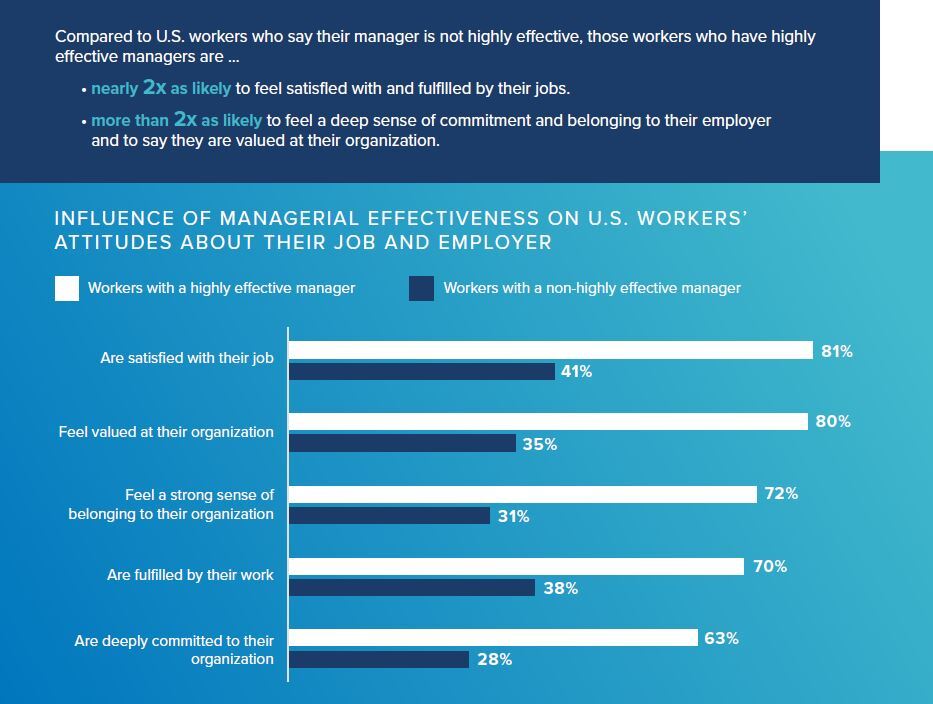- June 13, 2024
June 12, 2024 | Kathy Gurchiek

People managers are the linchpin to the employee experience, as well as accomplishing strategic business objectives, but they may not be getting the support they need to succeed, according to new SHRM research.
There is a relationship between highly effective managers and the commitment level of workers to the organization, SHRM researchers found. Of the 1,456 total U.S. workers surveyed, 63% of those who said their manager is highly effective also considered themselves “deeply committed to their organization.” Among those who said their manager was not highly effective, that number fell to just 28% feeling deeply committed.
And 92% of 336 senior executives said people managers are critical to their organizations’ overall success.
There is a relationship between highly effective managers and the commitment level of workers to the organization, SHRM researchers found. Of the 1,456 total U.S. workers surveyed, 63% of those who said their manager is highly effective also considered themselves “deeply committed to their organization.” Among those who said their manager was not highly effective, that number fell to just 28% feeling deeply committed.

But people managers need their leaders to provide support and resources to be effective. Among the 1,406 people managers surveyed, the challenges cited the most were:
- A heavy workload—33%.
- Balancing multiple responsibilities—22%.
- Insufficient resources or budget constraints—20%.
- Competing priorities—20%.
- Employee turnover and retention—20%.
People managers also need clarity on how their performance is measured. More than half of 1,092 HR professionals (59%) said people managers typically are judged on whether they fulfilled strategic goals; 57% said they are evaluated by their teams’ productivity and work quality.
When it comes to areas for further development, senior HR executives identified specific skills in need of improvement. More than half of the executives surveyed (54%) want their people managers to develop coaching and mentoring skills, and more than one-third (37%) would like them to develop strategic thinking skills.
People managers often feel caught in the middle between executive leaders’ strategic vision and the practical realities their team faces. Managers who often experience this situation are less likely to be highly effective managers and are more likely to experience high levels of job stress.
They’re also 2.5 times as likely to be actively looking for another job, according to the SHRM Research report “Effective People Managers: The Linchpin of Organizational Success.”
Recommendations
Above all else, people managers said they need clarity around their role and responsibilities to succeed, according to 43% of respondents. Also important to them: having structured goals and performance metrics (cited by 29%), better two-way communication channels (28%), regular performance evaluations with their manager (27%), and access to relevant resources and tools (25%).
SHRM researchers offered the following recommendations for how organizations can support their people managers:
- Clarify roles and goals. Start by conducting a job analysis and creating a detailed job description. Regularly update these descriptions as the business landscape shifts. Establish measurable goals, communicate them, and identify metrics around how the people managers will be evaluated.
- Provide a safe venue for sharing opinions and receiving respectful, constructive feedback. The higher-level manager also needs to provide consistent direction about the leadership’s top priorities of the moment and their expectations for the people manager.
- Provide people managers with the tools and resources they need. These tools can include project management software, up-to-date industry reports, and performance analytics capabilities. These are especially valuable for new managers. Only 30% of organizations have a formal onboarding process for internally promoted managers, according to the research.
To view the original articles posted on the Society for Human Resource’s (SHRM), click here.

